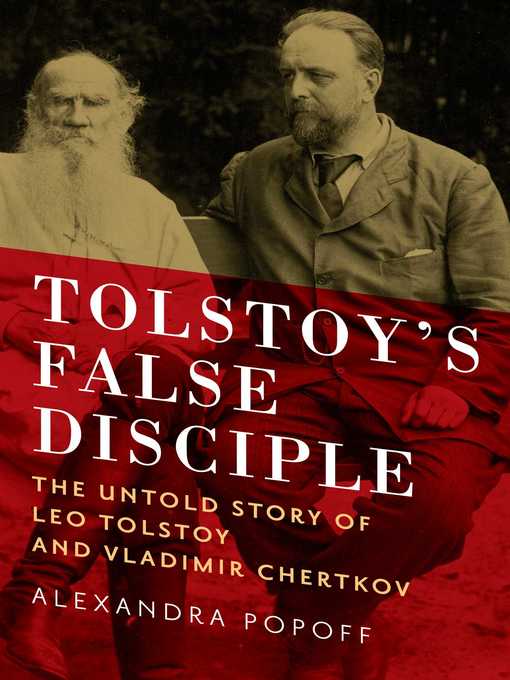
Tolstoy's False Disciple
- اطلاعات
- نقد و بررسی
- دیدگاه کاربران
نقد و بررسی

September 8, 2014
Vladimir Chertkov, a heretofore shadowy confidant of Leo Tolstoy, is brought to light in Popoff’s well-researched work. Chertkov’s letters to Tolstoy, which span their 30-year friendship, have long been suppressed by Russian authorities embarrassed by the great writer’s unlikely devotion to an abrasive, domineering aristocrat. Popoff gained special access to their correspondence for her biography of Tolstoy’s wife, Sophia, and now offers a deft portrait of the shadowy figure of Chertkov as a “Machiavellian” manipulator gifted at ingratiating himself to powerful men of all ideological stripes—first with the Tsars and later with Lenin and Stalin. Chertkov appealed to Tolstoy by playing the role of dutiful protégé, avowing Tolstoyan principles (poverty, humility, nonresistance) more dogmatically than Tolstoy himself. Popoff proposes that Chertkov exercised a kind of “mind control” over his ostensible master by creating a “compendium” of Tolstoy’s written thoughts and insisting the writer remain consistent with them. Tolstoy was opposed on principle to dealing with commercial practicalities, to the point of renouncing his copyright; Chertkov was thus left, following Tolstoy’s death, to contend (victoriously) with Sophia for executive authority over Tolstoy’s literary properties. Popoff’s account is unavoidably heavy on publishing intrigue, which can be tiring. Otherwise, the book is fascinating—and it fills a gap, providing the first full account of the bizarre relationship between a great man and his “moral antipode.” Agent: Don Fehr, Trident Media Group.

October 15, 2014
A Canadian biographer examines Leo Tolstoy's enigmatic love/friendship, which was steeped in shared Christian values. With access to heretofore unavailable archival material suppressed during the Soviet era due to its problematic Christian and homoerotic elements, Popoff (The Wives: The Women Behind Russia's Literary Giants, 2012, etc.) unearths details of Tolstoy's relationship with a handsome, younger, manipulative Russian aristocratic, Vladimir Chertkov (1854-1936), who seems to have had a huge influence over the novelist's final writings. When Tolstoy first met Chertkov, a former officer in the czar's Horse Guards who became an evangelical Christian during the so-called Petersburg revival of the 1870s, the great novelist, in his mid-50s, had undergone his own conversion and renounced his previous literary work in favor of dogmatic religious texts based on the teachings of Jesus. At 29, Chertkov, whose forebears moved in exalted aristocratic circles and whose father may have been Alexander II, ingratiated himself with Tolstoy through his heartfelt confessions of faith and sin, and their like-minded views of Christian faith and nonviolence. Their mutual confessions of "shameful thoughts" and sharing of diary entries (often destroyed) cemented a secretive bond between them, allowing Tolstoy to vent his frustrations about his wife, Sophia, and family. At first, Sophia was taken by the charming aristocrat, though Tolstoy's decision in 1885 to renounce copyright of his works from then on when he and Chertkov began their evangelical press hurt Sophia's income from Tolstoy's earlier collected works. Moreover, notes Popoff, Chertkov steered the direction of the master's numerous stories and even pressed him to change endings. In the end, Popoff finds only a nefarious influence in Chertkov, although Tolstoy dearly loved him, leading eventually to Tolstoy's disastrous abandonment of his family and his death. A work of dogged research helps elucidate Tolstoy's late-life conversion.
COPYRIGHT(2014) Kirkus Reviews, ALL RIGHTS RESERVED.

Starred review from November 1, 2014
The relationship between Vladimir Chertkov and Leo Tolstoy is one of the most fascinating episodes in literary history. How did one of the world's greatest writers and major spiritual voices of the late 19th/early 20th century end up following the guidance of a pedantic, arrogant man almost half his age and by no measure his equal? Using newly available materials, Popoff (Sophia Tolstoy) examines this odd "friendship," which is also the story of the unravelling of Tolstoy's marriage, family, and possibly even his mental health. Shortly after the publication of Anna Karenina, Tolstoy experienced a spiritual crisis that led to his attempted suicide and renouncing of the corrupting art of literature in favor of social and spiritual tracts and polemics. During this time (which included a book that inspired Gandhi's nonviolence movement), the Russian titan had become a figure of ridicule among the intelligentsia. Chertkov, however (raised in a family of early Russian evangelicals), approached the writer with reverence, not as a literary figure comparable to Homer, Shakespeare, or Pushkin but as a religious prophet on a biblical scale. Much of this tale of dysfunction and manipulation was covered in Jay Parini's novel, The Last Station (which became a 2009 movie starring Christopher Plummer as Tolstoy), as well as William L. Shirer's Love and Hatred, which darkly examines the novelist's wife, Sonya Tolstoy's, point of view of these events. VERDICT Popoff tells this strangely tragic story with the clarity, detail, and vigor reflective of great journalism and the seriousness of a scholar.--Herman Sutter, St. Agnes Acad., Houston
Copyright 2014 Library Journal, LLC Used with permission.




دیدگاه کاربران